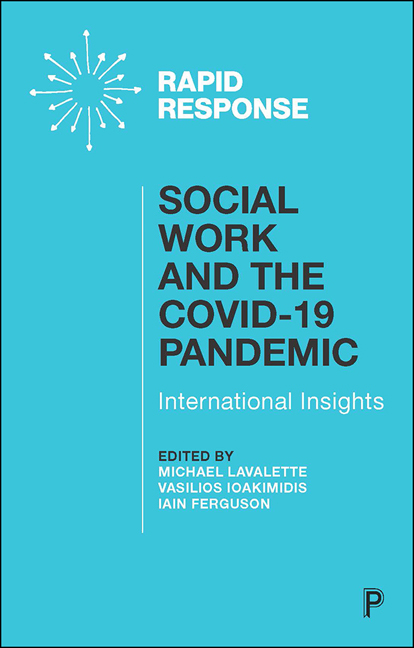20 - Rethinking Right and Wrong: Social Work, COVID-19 and the Crisis of Ethics
Published online by Cambridge University Press: 23 March 2021
Summary
This epidemic is not just about people who tested positive but also about people whose life ended and deteriorated as an indirect result of the inhuman management of this epidemic. (Hospital social worker, Canada)
One of the challenges I am currently facing is being more human than professional. (Medical social worker, Colombia)
We felt sad, stressed, and sometimes exhausted … we did not have time to think and reflect. I felt like I was at a war. (Community social worker, China)
Introduction
This chapter highlights the ethical implications of COVID-19, seeing it as a crisis of social justice for social work. Drawing on responses to an international survey, it illustrates how social workers had to rethink the meaning of ethical practice in real time, balancing privacy against health risks, empathy against efficiency and rule-following against being human. It argues for framing social work ethics with values of radical social justice and empathic solidarity at its heart.
COVID-19 and the crisis of ethics
The continuing impact of COVID-19 is as much a crisis of social justice, and hence of ethics, as it is of health or the economy. As such, it calls for a spirited social work response, which, as the title of this chapter suggests, calls into question ‘business as usual’. COVID-19 creates huge challenges for the profession, as social workers, social work organisations and governments work out what needs to change and how, both short and long term. These questions are not only political and practical, but also fundamentally ethical. The crisis of social justice brings to the surface perennial ethical questions about social, ecological and economic wellbeing; collective responsibility; and the legitimacy of systems of governance and social control, including:
What responsibility do humans have for each other and the global ecosystem?
How should scarce material resources be distributed fairly?
How much individual or community freedom should be curtailed in the public good?
What is ‘the public good’ anyway, and who gets to define and defend it?
These are big questions, to which social workers and social work organisations can make an important response from the frontline. Social workers witness everyday social injustices, experienced by the people with whom they work.
- Type
- Chapter
- Information
- Social Work and the COVID-19 PandemicInternational Insights, pp. 145 - 152Publisher: Bristol University PressPrint publication year: 2020



